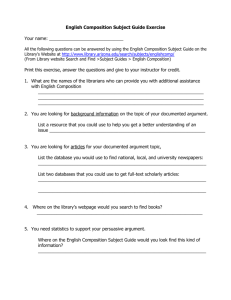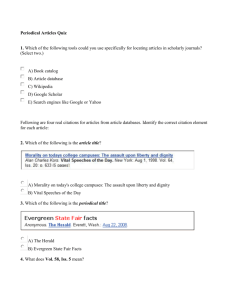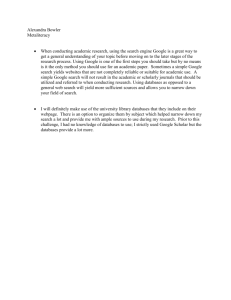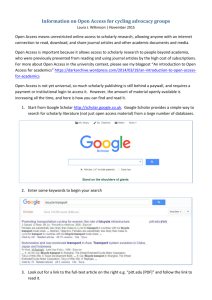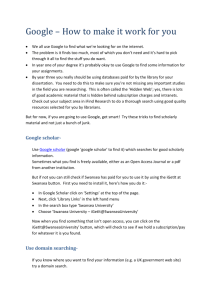Google or Google Scholar: That is the Question
advertisement
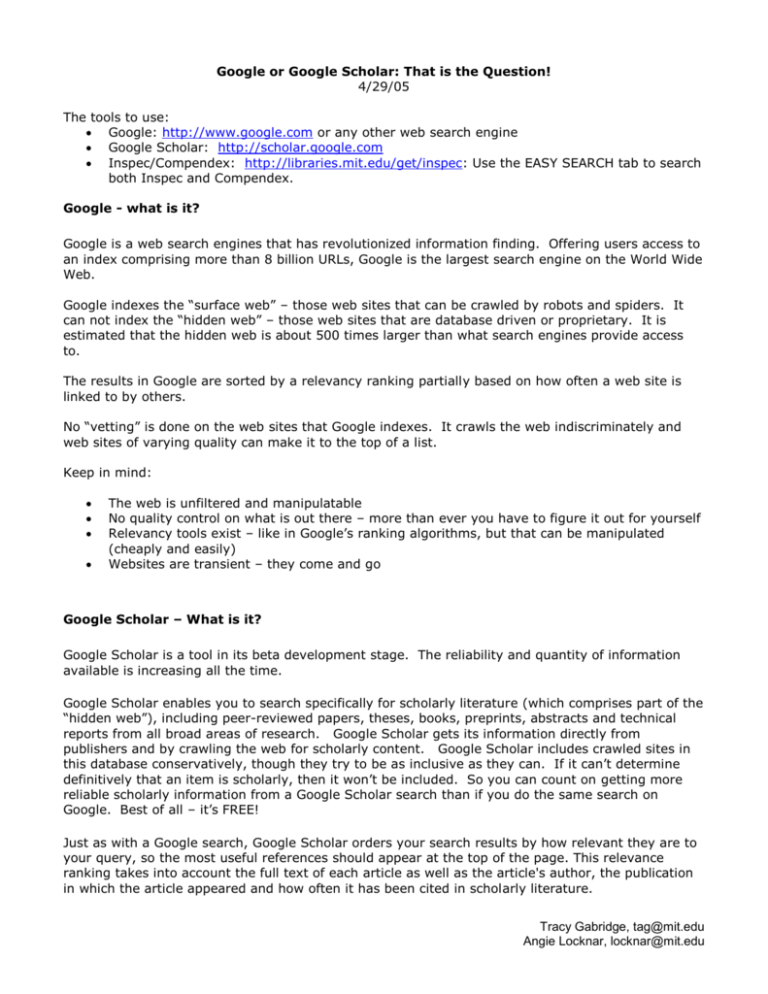
Google or Google Scholar: That is the Question! 4/29/05 The tools to use: Google: http://www.google.com or any other web search engine Google Scholar: http://scholar.google.com Inspec/Compendex: http://libraries.mit.edu/get/inspec: Use the EASY SEARCH tab to search both Inspec and Compendex. Google - what is it? Google is a web search engines that has revolutionized information finding. Offering users access to an index comprising more than 8 billion URLs, Google is the largest search engine on the World Wide Web. Google indexes the “surface web” – those web sites that can be crawled by robots and spiders. It can not index the “hidden web” – those web sites that are database driven or proprietary. It is estimated that the hidden web is about 500 times larger than what search engines provide access to. The results in Google are sorted by a relevancy ranking partially based on how often a web site is linked to by others. No “vetting” is done on the web sites that Google indexes. It crawls the web indiscriminately and web sites of varying quality can make it to the top of a list. Keep in mind: The web is unfiltered and manipulatable No quality control on what is out there – more than ever you have to figure it out for yourself Relevancy tools exist – like in Google’s ranking algorithms, but that can be manipulated (cheaply and easily) Websites are transient – they come and go Google Scholar – What is it? Google Scholar is a tool in its beta development stage. The reliability and quantity of information available is increasing all the time. Google Scholar enables you to search specifically for scholarly literature (which comprises part of the “hidden web”), including peer-reviewed papers, theses, books, preprints, abstracts and technical reports from all broad areas of research. Google Scholar gets its information directly from publishers and by crawling the web for scholarly content. Google Scholar includes crawled sites in this database conservatively, though they try to be as inclusive as they can. If it can’t determine definitively that an item is scholarly, then it won’t be included. So you can count on getting more reliable scholarly information from a Google Scholar search than if you do the same search on Google. Best of all – it’s FREE! Just as with a Google search, Google Scholar orders your search results by how relevant they are to your query, so the most useful references should appear at the top of the page. This relevance ranking takes into account the full text of each article as well as the article's author, the publication in which the article appeared and how often it has been cited in scholarly literature. Tracy Gabridge, tag@mit.edu Angie Locknar, locknar@mit.edu Current issues with Google Scholar: Can’t easily tell what’s included in Google Scholar The items included in Google Scholar are not updated from publishers on a regular, known cycle yet. Some data is already old. It may be hard to locate some very current articles. It doesn’t include publications by Elsevier or the American Chemical Society, two huge Science and Technology publishers. They claim to include all citations from PubMed and other databases, but independent tests show that this isn’t true yet. Bottom line, this is a good and improving tool – but it is not yet fully developed or complete. Use it for quick, good-enough results – but not necessarily for thorough research on your dissertation. TIPS: If you are on campus at MIT, an MIT Access link will appear after items that are included in one of the MIT Libraries' paid subscriptions. If you are off campus, click on Scholar Preferences from the main Google Scholar page and select the box for MIT. Save your preferences and then go back to searching. (If you are searching from off-campus you will need to have valid certificates on your computer to get access to the MIT Libraries' resources). The Cited By link indicates how many times this document was cited by other works that are indexed in Google Scholar. The links across the bottom indicate where Google Scholar found this document on the internet. For more information on Google Scholar and how it works at MIT, see http://libraries.mit.edu/help/google-scholar/. Tracy Gabridge, tag@mit.edu Angie Locknar, locknar@mit.edu YOUR CHALLENGE Your task is to search for the topic protein folding algorithms in the three tools given at the beginning of this handout. Try to find information about the following questions in those tools. There is no right or wrong answer. Look at the results found using each tool and think about what you are finding and if it would be appropriate for the following questions. What tool is best for each question? - What are the most highly cited articles on this topic? - Find some current scholarly articles. - Find a review article to get some background on the topic. - Who are the leading researchers or research labs in the field? - Find the name of a company involved in developing protein folding algorithms. - Does anyone at MIT publish in this area of research? - What are the significant conferences, journals, publishers in this field? Google or other search engines Highly cited articles Google Scholar Inspec/ Compendex X Current scholarly articles X Review articles X Leading researchers X Companies X Authors from MIT? X Significant conferences, journals or publishers? X More Links: Web of Science http://libraries.mit.edu/get/webofsci CiteSeer http://citeseer.ist.psu.edu/ MIT Libraries http://libraries.mit.edu Ask Us! http://libraries.mit.edu/ask Tracy Gabridge, tag@mit.edu Angie Locknar, locknar@mit.edu
